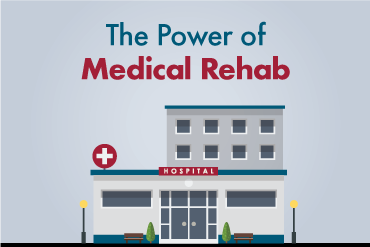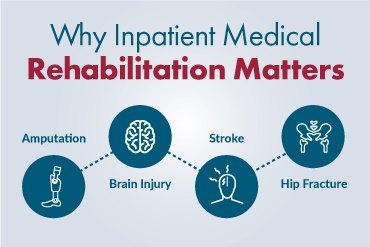Questions to Ask
Post-acute care includes rehabilitation services that patients receive after a stay in an “acute care hospital.” (An acute care hospital is what you usually think of when you hear the word “hospital.”) Depending on the intensity of care the patient requires, treatment may include a stay in a facility, ongoing outpatient therapy or care provided at home. Post-acute care settings include inpatient rehabilitation hospitals and units, long-term care hospitals, skilled nursing facilities and home health agencies.
Inpatient rehabilitation hospitals and units take a highly integrated team approach to treatment. The rehabilitation team is led by a licensed physician with specialized training and experience in inpatient rehabilitation. Other team members include rehabilitation nurses, physical therapists, occupational therapists, speech-language pathologists, psychologists and neuropsychologists, cognitive therapists, social workers/case managers and dietitians. Depending on the patient’s needs, prosthetists, orthotists, recreation therapists and other clinicians may be part of the rehabilitation team.
Treatment is generally more intensive with five days per week of therapy and is tailored to each patients’ unique needs and rehabilitation goals. Inpatient rehabilitation hospital teams work to help patients reach their optimal abilities, independence and quality of life.
Both Medicare and insurance companies have specific criteria that patients must meet to qualify for this higher level of rehabilitation care. Under Medicare guidelines, in order for a patient to be admitted to a rehabilitation hospital or unit, a rehabilitation physician must certify that the person needs this type of specialized, intensive care. Insurance companies have similar requirements.
Rehabilitation hospitals offer a unique level of care – a highly specialized, medically supervised and carefully coordinated program that improves a patient’s function, mobility, cognition and independence. This may include restoring the abilities to perform daily tasks like bathing, dressing and eating, as well as the more complex skills that enable patients to successfully return to home, work, school and community activities.
Studies have shown that compared to other post-acute care providers, patients treated in inpatient rehabilitation hospitals and units benefit from:
- A physician-led, interdiscplinary approach to care
- Treatment tailored to individual needs and goals
- Greater improvement in functional skills
- Returning home sooner
- Increased independence
- Fewer medical complications
- Lower rates of readmission to the hospital
- Improved quality of life
Choosing medical rehabilitation care for yourself or a loved one can be daunting. Some patients will want to select care based on the expertise of the hospital or unit with their particular condition, while others take into consideration proximity to where they live. Although a variety of factors may influence which location is right for you or your loved one, all inpatient rehabilitation hospitals offer professional care from a team of licensed providers focused on delivering the treatment you need to reach your recovery goals.
Rehabilitation Infographics & Tip Sheets

The Power of Medical Rehab
On average, patients treated in inpatient medical rehabilitation hospitals and units have better outcomes, fewer emergency room visits and live longer than similar patients treated in skilled nursing facilities.

Why Inpatient Medical Rehabilitation Matters
Patients with some common conditions, such as amputation, brain injury, stroke, and hip fractures do in inpatient medical rehabilitation hospitals and units compared to similar patients treated in skilled nursing facilities.

Types of Treatments offered at Inpatient Rehabilitation Hospitals
At an inpatient rehabilitation hospital or unit, patients benefit from a highly coordinated, team approach to care led by a physiatrist, a board certified doctor in physical medicine and rehabilitation. Treatment is tailored to each patient's individual needs and rehabilitation goals.
Common Rehabilitation Terms
ADL (Activities of Daily Living)
The tasks of everyday life. Basic ADLs include eating, dressing, getting into or out of a bed or chair, taking
Admission Date
The date the patient was admitted for inpatient care, outpatient service or start of care. For an admission notice for
Case Manager
A nurse, doctor or social worker who arranges all services that are needed to give proper health care to a
Center for Medicare and Medicaid Services (CMS)
The U.S. Department of Health and Human Services’ agency responsible for Medicare and parts of Medicaid. The Centers for Medicare
Department of Health and Human Services
HHS administers many of the “social” programs at the federal level dealing with the health and welfare of the citizens
Dialysis
Dialysis is a treatment that cleans your blood when your kidneys do not work. It gets rid of harmful wastes
